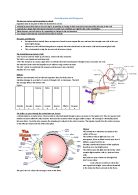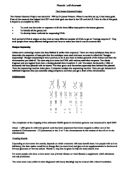Compare and contrast the role of the endocrine system and the nervous system, in coordination
Both the endocrine system and the nervous system are vital to the survival of organisms. To appreciate their similarities and differences fully we must review their function within humans. The nervous system coordinates the activities of muscles, monitors the organs, constructs and processes input from the senses, and initiates actions or responses. The endocrine system is a control system of ductless endocrine glands that secrete chemical messengers called hormones that circulate within the body via the bloodstream to affect distance organs (referred to as target organs).
Both systems are similar in that they affect a target organ or organs, however their affect on these organs is quite different. If we were to examine a simple reflex arc or all nervous coordination in general, we would find that the effect of a nerve impulse, whether it is in a simple reflex arc or a muscle contraction, is short lived. For example when touching a hot plate an immediate response will be produced. In contrast, looking at the mechanisms involved in the control of blood glucose levels for example, we find that the effect of hormones is long lasting on target organs. Additionally it is also important to note that hormones have a widespread effect meaning they affect more than one organ at a time, whereas nerve impulses typically only affect one organ at a time. These differences may be related to the speed at which hormones and nerve impulse are transmitted. Nervous impulse travel as waves of depolarisation along long nerve fibres by a method known as salutatory conduction, where the impulses jump from one Node of Ranvier to the next, speeding up the transmission. Hormones however, travel through the blood in which case they travel slowly.







